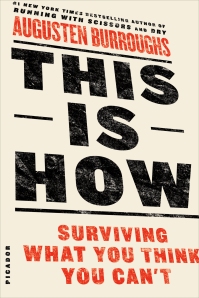For most, Augusten Burroughs‘ name is synonymous with his best-selling memoir, Running with Scissors, an account of his troubled and, at times, disturbing adolescence in Western Massachusetts. His most recent work, This is How: Surviving What You Think You Can’t, is quite a different venture; in chapters with titles like, “How to Hold On to Your Dream or Maybe Not,” “How to End Your Life,” or “How to Be Thin,” Burroughs expounds on the topic with insights both humorous and compassionate, anecdotes from his own life, and a desire to differentiate his advice from that of the “dishonest” self-help bibles. Due to his bevy of life experience and familiar tone, one trusts Burroughs instantly and is willing to accept his deal: he won’t sugarcoat if one agrees to accept the truth.
From the first page, in which Burroughs details an infuriating elevator incident, he also establishes the ethos that will dominate the next 200 pages. Positive-thinking, mantras, and ideas like “healing” and “making peace with the past” are eschewed by the author, and the reader is presented with tangible, secular solutions to everyday agonies. Throughout the book, Burroughs’ constant refrain is one of personal responsibility, a message that, while not necessarily new, is still refreshing. Some of the topics discussed bleed into each other, which unfortunately makes for an occasionally repetitive read, but this does not detract from the book’s message.
Burroughs does not employ Sartrean terminology but, like the French philosopher, he urges readers to question their feelings and not to live in a state of “bad faith,” in which they hold beliefs contradictory to the truth. Taking responsibility for one’s reactions to life is of the utmost importance to the author. No promises are made–negative emotions like pain or regret will not fade but can be managed and, most importantly, not exacerbated. Burroughs’ opinions are helpful because they do not involve standing in front of a mirror repeating “I am beautiful” until it ceases to have meaning, or relying on forces other than those within oneself. Bequeathing a certain amount of responsibility on the reader can be especially powerful for those who have experienced some great suffering and feel helpless in their lives. This is How gently toes the line between sympathy and honesty, in that Burroughs gives one permission to feel negative emotions but not to stew in them.
This is How: Surviving What You Think You Can’t can be purchased for $15 here.









